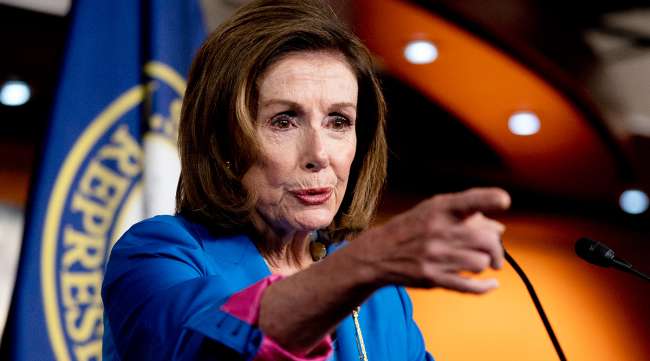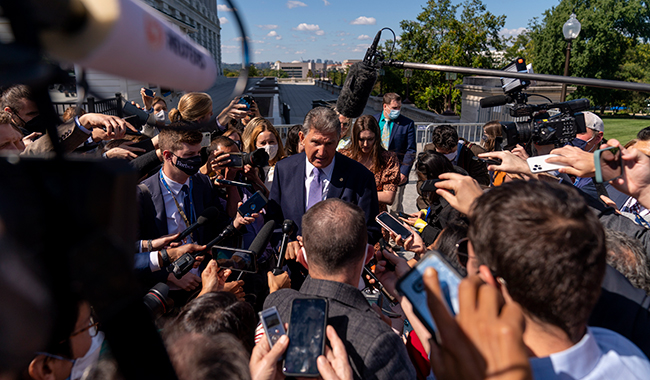Associated Press
No Vote Held on Infrastructure, but Talks to Resume

[Stay on top of transportation news: Get TTNews in your inbox.]
WASHINGTON — Despite a long night of frantic negotiations, Democrats were unable late Sept. 30 to reach an immediate deal to salvage President Joe Biden’s $3.5 trillion government overhaul, forcing leaders to call off promised votes on a related infrastructure bill. Action is to resume Oct. 1.
Speaker Nancy Pelosi had pushed the House into an evening session and top White House advisers huddled for talks at the Capitol as the Democratic leaders worked to negotiate a scaled-back plan that centrist holdouts would accept. Biden had cleared his schedule for calls with lawmakers but it appeared no deal was within reach, particularly with Democratic Sen. Joe Manchin.
Despite failing to bring a promised vote to the floor on the $1 trillion infrastructure bill already passed by the Senate, Pelosi called it a “day of progress” in a letter to colleagues, but offered few other words on the path forward.
State of Play
As of 8:15 p.m. EDT Oct. 1
Short-term spending bill: Approved Sept. 30; keeps government funded to Dec. 3
Infrastructure bill: No vote taken in House pending agreement on larger reconciliation bill
Highway funding reauthorization: Expired at midnight Sept. 30; House approved a 30-day extension; Senate to take up Saturday
Congress did pass, and Biden did sign, a nine-week spending bill to avert a U.S. government shutdown. Not addressed, however, was the highway funding law that expired at midnight. The House and Senate will be back in session Oct. 1.
At immediate risk was the first piece of Biden’s proposal, the slimmer $1 trillion infrastructure bill that is widely supported but has faltered amid stalled talks on his more ambitious package. Progressives were refusing to back the roads-and-bridges bill they view as insufficient unless there’s progress on Biden’s broader plan that’s the heart of the Democratic agenda.
White House Press Secretary Jen Psaki released a statement saying: “A great deal of progress has been made this week, and we are closer to an agreement than ever. But we are not there yet, and so, we will need some additional time to finish the work, starting tomorrow morning first thing.”
The president’s sweeping proposal topped at $3.5 trillion would essentially raise taxes on corporations and the wealthy and plow that money back into government health care, education and other programs, all of it touching the lives of countless Americans. He says the ultimate price tag is zero, because the tax revenue covers the spending costs.
With Biden working the phones and top White House officials shuttling at the Capitol, talk swirled of the Democratic leaders trying to ease off the stalemate by reaching a broader deal, a compromise with Manchin and Sen. Kyrsten Sinema of Arizona, two centrist Democrats who are the linchpins to Biden’s goals.
The idea was to produce the contours of an agreement over Biden’s broader package, proceed with the $1 trillion infrastructure bill and negotiate the rest of Biden’s big health care, education and climate change bill in the days to come. Lawmakers were told to stick around for possible late-night votes.
But as the night dragged on, it became clear that Manchin was not on board with a higher figure and chiseling away at that $3.5 trillion topline risked losing progressive leaders who said they have already compromised enough and saw no reason to rush a deal to bring the centrists around to supporting the president’s agenda.
A Highway Trust Fund shutdown of at least some duration is now pretty much inevitable... https://t.co/SmfwRzsGyv — Jeff Davis (@JDwithTW) October 1, 2021
“We’ve been fighting for transformative legislation as all of you know, these discussions have gone on for month after month after month,” said Sen. Bernie Sanders (I-Vt.), the chairman of the Budget Committee and a leading progressive lawmaker. “This is not a baseball game. This is the most significant piece of legislation in 70 years.”
The infrastructure bill is one piece of that broader Biden vision, a $1 trillion investment in routine transportation, broadband, water systems and other projects bolstered with extra funding. It won bipartisan support in the Senate but has now become snared by the broader debate.
Attention remains squarely focused on Manchin and Sinema, two centrist Democrats who helped steer that bipartisan bill to passage, but have concerns that Biden’s overall bill is too big. The two senators have infuriated colleagues by not making any counter-proposals public.

Sen. Joe Manchin (D-W.Va.) meets with reporters Sept. 30, saying he had been clear about his topline budget figure. (Andrew Harnik/Associated Press)
Under scrutiny, Manchin called an impromptu press conference Sept. 30 outside the Capitol, insisting he has been clear from the start.
Sinema was similarly working to stave off criticism and her office said claims that she has not been forthcoming are “false” — though she has not publicly disclosed her views over what size package she wants and has declined to answer questions about her position.
Democrats’ campaign promises on the line, the chairwoman of the Congressional Progressive Caucus, Rep. Pramila Jayapal, said exiting Pelosi’s office that the progressives’ views were unchanged -- they won’t vote for one bill without the other and would stay all weekend to get a deal.
“Inaction is insanity,” said Rep. Ilhan Omar (D-Minn.), another progressive leader, pointing her criticism clear at Manchin’s remarks.
“Trying to kill your party’s agenda is insanity. Not trying to make sure the president we all worked so hard to elect, his agenda pass, is insanity.”
Associated Press writers Mary Clare Jalonick, Brian Slodysko and Zeke Miller contributed to this report.
Want more news? Listen to today's daily briefing below or go here for more info:




